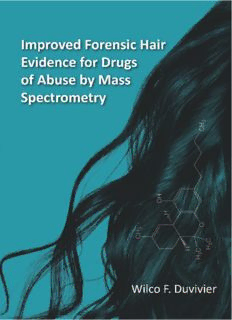
Improved Forensic Hair Evidence for Drugs of Abuse by Mass Spectrometry PDF
Preview Improved Forensic Hair Evidence for Drugs of Abuse by Mass Spectrometry
Improved Forensic Hair Evidence for Drugs of Abuse by Mass Spectrometry Wilco F. Duvivier Thesis committee Promotor Prof. Dr M.W.F. Nielen Professor of Analytical Chemistry, with special emphasis for the detection of chemical food contaminants Wageningen University Co-promotor Dr T.A. van Beek Assistant professor, Laboratory of Organic Chemistry Wageningen University Other members Prof. Dr H.A. Schols, Wageningen University Prof. Dr R.M.A. Heeren, Maastricht University Prof. Dr A.C. van Asten, University of Amsterdam Dr F. Drijfhout, Keele University, Staffordshire, United Kingdom This research was conducted under the auspices of the Graduate School VLAG (Advanced studies in Food Technology, Agrobiotechnology, Nutrition and Health Sciences). Improved Forensic Hair Evidence for Drugs of Abuse by Mass Spectrometry Wilco F. Duvivier Thesis submitted in fulfilment of the requirements for the degree of doctor at Wageningen University by the authority of the Rector Magnificus Prof. Dr A.P.J. Mol, in the presence of the Thesis Committee appointed by the Academic Board to be defended in public on Tuesday 5 July 2016 at 4 p.m. in the Aula. Wilco F. Duvivier Improved Forensic Hair Evidence for Drugs of Abuse by Mass Spectrometry 194 pages. PhD thesis, Wageningen University, Wageningen, NL (2016) With references, with summaries in English and Dutch ISBN 978-94-6257-815-9 DOI 10.18174/381180 Table of contents List of abbreviations 7 Chapter 1: General Introduction 9 Chapter 2: Evidence Based Decontamination Protocols for the Removal of 33 External Δ9-Tetrahydrocannabinol from Contaminated Hair Chapter 3: Rapid Analysis of Δ9-Tetrahydrocannabinol in Hair using Direct 63 Analysis in Real Time Ambient Ionization Orbitrap Mass Spectrometry Chapter 4: (Un)targeted Scanning of Locks of Hair for Drugs of Abuse by 83 Direct Analysis in Real Time − High-Resolution Mass Spectrometry Chapter 5: Critical Comparison of Mass Analyzers for Forensic Hair 115 Analysis by Ambient Ionization Mass Spectrometry Chapter 6: Ultratrace LC–MS/MS Analysis of Segmented Calf Hair for 139 Retrospective Assessment of Time of Clenbuterol Administration in Agriforensics Chapter 7: General Discussion and Future Perspectives 157 Summary 175 Samenvatting 179 Acknowledgments 183 Curriculum Vitae 187 List of Publications 189 Overview of Completed Training Activities 191 List of abbreviations APCI – atmospheric pressure chemical ionization APPI – atmospheric pressure photoionization ASE – accelerated solvent extraction BZE – benzoylecgonine CBD – cannabidiol CBN – cannabinol CE – capillary electrophoresis CID – collision-induced dissociation DAPCI – desorption atmospheric pressure chemical ionization DART – direct analysis in real time DCBI – desorption corona beam ionization DESI – desorption electrospray ionization EIC – extracted ion chronogram FWHM – full width at half maximum GC – gas chromatography GHB – gamma-hydroxybutyric acid HCD – higher–energy collisional dissociation HRMS – high resolution mass spectrometry LAESI – laser ablation electrospray ionization LC – liquid chromatography LLE – liquid-liquid extraction LOD – limit of detection LTP – low-temperature plasma MALDI – matrix-assisted laser desorption/ionization MDMA – 3,4-methylenedioxymethamphetamine 7 MetA–SIMS – metal assisted-secondary ion mass spectrometry MMS – matrix-matched standards MRM – multiple reaction monitoring MS – mass spectrometry MS/MS – tandem mass spectrometry NCE – normalized collision energy PADI – plasma assisted desorption ionization PMMA – p-methoxymethylamphetamine RSD – relative standard deviation SDS – sodium dodecyl sulfate SEM – scanning electron microscopy SFE – supercritical fluid extraction SoHT – Society of Hair Testing SPE – solid phase extraction SRM – selected reaction monitoring THCA–A – Δ9-tetrahydrocannabinolic acid THC – Δ9-tetrahydrocannabinol THC–COOH – 11-nor-9-carboxy-Δ9-tetrahydrocannabinol TIC – total ion current TLC – thin layer chromatography TOF – time-of-flight TWIM – travelling wave ion mobility U(H)PLC – ultra(high)-performance liquid chromatography 8 Chapter 1 General Introduction 9
Description: